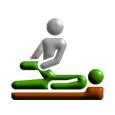VESTIBULAR DISORDERS
Vestibular physiotherapy addresses problems with your ‘Vestibular System’. In a nutshell the ‘Vestibular System’ contributes to your balance and spatial orientation (where you think you are in space).
Symptoms may include vertigo, dizziness, spinning, nausea, light headedness, ringing in the ears (tinnitus), double vision, or loss of balance. It may affect your daily life in activities such as getting out of bed or driving the car. The most common medical diagnosis which can contribute to these symptoms is Benign Paroxysmal Positional Vertigo (BPPV).
Untreated the symptoms can deteriorate and lead to anxiety, a loss of confidence, poor concentration, inactivity, a loss of independence and an increased risk of falls and associated injuries.
We have specific skills in a treatment for Vestibular problems which is known as Vestibular Rehabilitation Therapy (VRT).
If you would like to know more about Vestibular Rehabilitation
please get in touch and speak to one of our Physiotherapists.
What causes vestibular symptoms?
When the vestibular system is damaged by disease or injury, the brain can struggle to rely on them for accurate information about balance and movement. This can result in symptoms which can commonly include dizziness, vertigo and impaired balance as well as many other symptoms. Often recovery can occur spontaneously because the brain adapts through a process called vestibular compensation.
If this process fails then you can be left with the symptoms which often result in changes in the patterns of head and body movement in an attempt to avoid the dizziness and nausea. Unfortunately these strategies can make vestibular compensation even more difficult and may provoke new symptoms like headaches, muscle tension and fatigue.
What happens during treatment?
The aim of Vestibular Rehabilitation Therapy (VRT) is to retrain the brain to recognise and process signals from the vestibular system in coordination with your vision and spatial awareness. It works by de-sensitising the balance system to the movements that provoke the symptoms.
We will first conduct a thorough assessment which begins with you telling us all about your symptoms including how long you have had them, what makes them worse and what makes them better. We will check through your medical history and then look at posture, balance, gait and any strategies that you may use to compensate…..often you won’t know what you are doing to try and make things better. We also use specific tests to assess eye/head movements.
It’s then time for us to use our specialist treatment skills in working out how best we can challenge your vestibular system and re-train your brain to adapt so that you can improve your symptoms. We develop a unique treatment plan for you which will involve a vestibular exercise program along with education and advice. As we are all experienced rehabilitation therapists we will also incorporate a functional balance program into your treatment plan. If you are suffering from muscles tension and/or headaches then the treatment plan may involve ‘hands on’ physiotherapy techniques such as massage and manual therapy.
What are the effects?
VRT can initially increase the symptoms as the body and brain try to formulate and understand new patterns of movement. The big mistake is stopping at this point because you think things are getting worse. In most cases if you perform the exercises correctly and regularly over time then the research shows that your balance improves. Muscle tension, headaches and fatigue slowly diminish and the dizziness, nausea and vertigo disappear.







